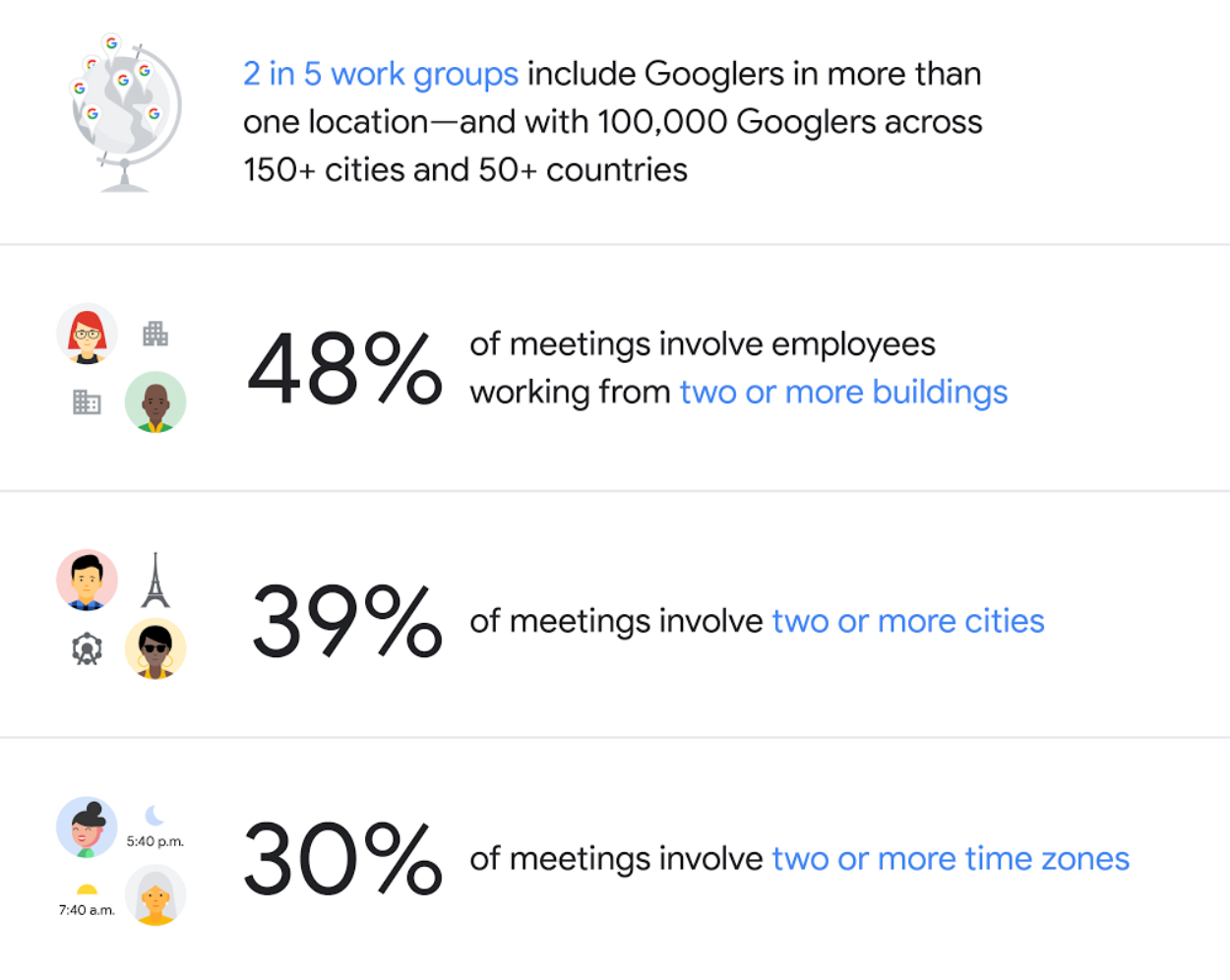Even as employees push for the ability to work remotely, some companies resist, concerned that employees who don’t come to the office on a regular basis are less productive. A recent study of Google employees eases that fear but raises an additional concern.
 For two years, Google conducted a study of 5,600 employees across the U.S., Europe, the Middle East, Asia, and Africa. Forty percent of the entire company’s workgroups have employees in more than one location, whether that is a different building or city. Thirty percent of company meetings involve employees who live in two or more time zones.
For two years, Google conducted a study of 5,600 employees across the U.S., Europe, the Middle East, Asia, and Africa. Forty percent of the entire company’s workgroups have employees in more than one location, whether that is a different building or city. Thirty percent of company meetings involve employees who live in two or more time zones.
When Google leaders initiated the study, they anticipated finding that remote employees were not as productive as those who primarily worked in office. However, they found no differences in effectiveness, performance ratings, or promotions between the two groups. Whether employees worked onsite or remotely, their sense of well-being was comparable, as both types of workers maintained work/life balance.
However, Google did discover that remote workers felt less connected with their fellow employees in different parts of the world. Part of that was due to logistic as scheduling meetings between time zones was challenging. Part of that sense of disconnect was due to preparation: using outdated technology with glitches in video or sound made having a smooth conversation difficult.
Work Remotely Trending Up
Despite the problems with technology, the trend of working remotely is rising. Employees seek the flexibility and work/life balance that working remotely offers, and companies are buying in too. Wellable recently reported that 70% of employers offer some sort of remote work, even if it’s not on a full-time basis. In addition to employees wanting to work remotely, the rise of freelance workers, representing 36% of the workforce, only adds to that dynamic of people who work in disparate locations.
Companies benefit from remote workers too. Without having to maintain the same amount of office space, overhead is lower. Remote employees that don’t have to build commuting time into their schedules can also be more productive, and employers can expand their talent pool beyond those candidates who live commuting distance to the office.
Companies Seeking To Make Working Remotely A Win-Win
As the Google study indicates, even though employees like the freedom of remote working, they can feel cut off from their co-workers. Being connected to the team and feeling a part of the overall company are key aspects of helping employees feel engaged, and engaged employees are more likely to be more productive.
Companies who want to make remote working effective, need to intentionally create a process for a positive remote working environment. Veronica Gilrane, Google’s People Analytics Manager, who spearheaded the study, suggests companies with remote employees consider the following:
- Spend a few minutes during meetings for “small talk” to get to know each other. While this might be done more naturally when employees pass each other in the hall, that practice needs to be consciously added when the team is in different locations.
- Discuss expectations. Find out what employees’ preferred working hours are so meetings and conversations can happen during that time. If needed, set core hours that overlap. However, ensure that employees in one time zone aren’t always the ones who are inconvenienced by the meeting or core work time.
- Encourage in-person and virtual connections. Look for opportunities to meet face to face. Use video calls when possible. When having an onsite meeting and including remote employees, instead of having the onsite group meet in the conference room and the remote employees dial in, some companies have even the onsite employees connect through video at their desks so all employees are on equal ground.
Remote working is here to stay for the foreseeable future. But loneliness can affect employees’ mental and physical well-being. By creating practices that ensure remote workers are included, engaged and connected, both businesses and employees gain from this benefit.












